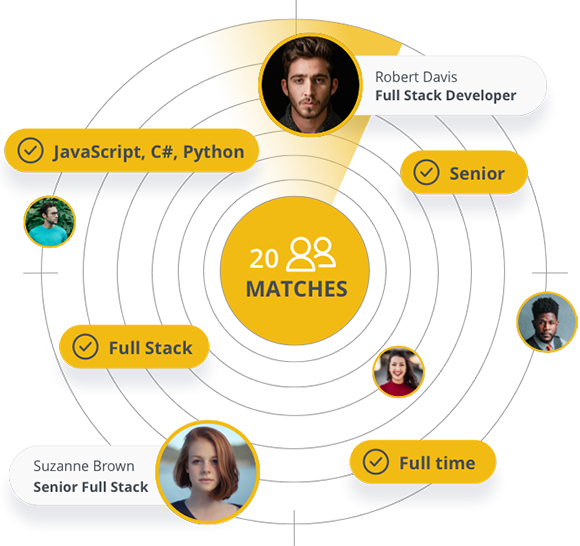Hiring genuinely good tech talent in today’s talent market can be challenging. More companies than ever before are undergoing digital transformations causing a shortage of specialist developers.
With that said, full-stack developers are the easiest type of developer to come by. 48% of all developers classify themselves as being “full-stack”, according to a survey by StackOverflow.
Employers tend to prefer developers who specialize in a particular area of development, such as “back-end”, or even more specialized like “Ruby back-end”. This leaves more unspecialized developers waiting to be hired.
This guide will show you how you can easily find and hire an excellent full-stack developer.
> Oh, by the way, we’ve put all of our articles and resources on how to find and hire developers here. <
What is meant by full-stack development?
The definition of a full-stack developer is a software developer who has the knowledge and skills needed to develop every aspect of a computer application. A full-stack developer can write both front-end and back-end code.
The front end of an application generates the user interface and handles communication with the back end.
The back end of an application processes requests sent from the front end, sends resources and data to the front end, accesses files and databases, and performs more computationally intensive tasks.
A single full-stack developer can make a prototype application quicker than a team of specialized developers, mainly because they don’t need to communicate with other team members.
The main disadvantage of a full-stack developer is that, while they may understand all aspects of app development, they are unlikely to be a master of every aspect (if any).
What are the requirements for full-stack developers?
A full-stack developer must know at least one full technology stack. A technology stack is a list of all the tech services needed to create a computer application.
Some popular tech stacks are:
- The MEAN stack: A MongoDB database with the JavaScript-based Node.js and Express frameworks on the back end, and the JavaScript-based AngularJS framework on the front end.
- The Django stack: A MySQL database with the Python-based framework Django on the back end, serving server-side-generated web pages and JavaScript scripts to the front end.
- Ruby on Rails: An SQLite database with the Ruby-based framework Ruby on Rails on the back end, serving server-side-generated web pages and JavaScript scripts to the front end.
A developer can call themselves a full-stack developer if they know any full tech stack. However, knowing one full tech stack doesn’t mean that a developer can create any type of program. For example, web apps and mobile apps require knowledge of different stacks.
A good full-stack developer won’t insist on using one specific tech stack for every application they make. The ideal full-stack developer will have experience with many different stacks. They will know which stack is most suitable to use to create your specific application.
Which language is best for full stack developers?
Front-end languages
Every full-stack developer building web apps must know JavaScript, HTML, and CSS. All webpages are written using these languages.
Full-stack developers building mobile apps for iOS will need to know Objective-C or Swift.
Developers building apps for Android typically develop with Java or Kotlin.
Full-stack developers can alternatively create mobile apps using a framework where they write with a different language. For example, the React Native framework can generate applications that work on Android and iOS from JavaScript code which isn’t traditionally used to write mobile apps.
Back-end languages
A good full-stack developer will have worked with several different programming languages that can be used on the back end, such as JavaScript, PHP, Ruby, Python, and Java.
A good full-stack developer will choose the programming language that’s best suited for the functionality to be created, rather than what they are most used to.
Database languages
A full-stack developer needs to know how to query whatever type of database they’re using in their tech stack. For example, Structured Query Language (SQL) is used to access data from MySQL and SQLite databases.
Where can I find full-stack developers?
Consider each of these places when searching for a full-stack developer:
- CodinGame Sourcing
- Freelancer platforms
- Full-stack developer communities
- Generic programming Q&A websites
- Code repositories
- Social media
- In-person and remote networking
CodinGame Sourcing
CodinGame can save you all the work of finding a full-stack developer yourself with its service CodinGame Sourcing.

CodinGame Sourcing will connect you with your ideal full-stack developer using its powerful matching algorithms.
Try CodinGame Sourcing today for free to get access to a pool of top full-stack developers, from within the vast CodinGame community.
Freelancer platforms
You’ve probably heard of either Upwork or Freelancer. They’re the two biggest freelance job websites out there.
Upwork and Freelancer are filled with full-stack developers. The problem is that most developers on these giant freelance platforms are low-quality. You can still find the top full-stack developers among the crowds if you know how to screen developers effectively.
Alternatively, you use freelancing sites with developers who are known to be excellent, such as Toptal and TopCoder. You’ll have to pay more to hire using these sites, but you’ll get a faster time-to-hire.
You should also check out these other reputable freelance job websites: 10X Management, WeWorkRemotely, Guru, YouTeam, Gun.io, and Codeable.
Full-stack developer communities
Community discussion forums are a hotspot for full-stack developers.
Some of the most popular full-stack developer communities are Coderwall, CoffeeCup, and Reddit.
Full-stack developers congregate on these sites to compare their latest projects and get answers to their niche questions.
Find the developers who are most active in these forums. They are the passionate ones; the ones who love development so much that they spend their leisure time talking about it. Reach out to them about your project and see if they’re interested.
Generic programming Q&A websites
You can also check out the web development and application sections of some generic programming Q&A websites to find experienced full-stack developers.
StackOverflow is the largest coder Q&A site out there. Identify the authors with lots of highly up-voted answers to application development questions. Reach out to them with your project offers.
Code repositories
A public code repository is where developers of all skill levels can make their code projects available for everyone to see.
GitHub is the most popular public code repository. Developers upload their code to GitHub, and other developers vote for the most innovative and exciting projects.
Check out the trending page on GitHub. Reach out to the publishers of the app projects with lots of up-votes.
Social media
The most efficient social media platform for finding developers of any kind is LinkedIn.
LinkedIn lets you find full-stack developers quickly by searching for skills. Find a full-stack developer by searching for people with front-end, back-end, and database skills.
When developers list their skills on LinkedIn, other developers can endorse those skills to increase your confidence in their legitimacy. You can be confident that someone is an experienced full-stack developer if other established developers highly endorse their skills.
Don’t spam-message a bunch of suitable full-stack developers with a generic recruitment message. They get them all the time!
Be different. Get the attention of developers by doing something special. Why not offer them a gift, such as a subscription to a paid educational programming platform? Consider the gift an expense, just like paying to hire through a freelance job platform.
In-person and remote networking
Networking with full-stack developers in-person enables you to engage with them in ways not possible online.
Some of the most successful full-stack developer events are Full Stack Europe, DevTernity, and Craft Conf. You can see a long list of full-stack conferences here.
Tech networking events don’t stop with conferences. Join in at university and college career events to secure full-stack talent before they know just how in-demand they’ll be upon entering the working world.
If you want to host your own online event, you can easily do so with CodinGame’s Clash of Code. Create your own coding competition. Invite a bunch of full-stack developers to it from the places we’ve explored in the guide. Then, see who has the best skills!
The 5 best places to find full-stack developers
The best full-stack conferences include DevTernity, Full Stack Europe, and Craft Conf.
Many conferences let you set up a booth. Make sure you offer an engaging experience, such as a mini-hackathon or a VR game. Developers will want to come over to talk to you, which gives you the opportunity to pitch to them to work on your project.
Conferences are being held online during the COVID-19 pandemic but will be back in-person as soon as it’s safe to do so.
The most talented full-stack developers don’t search for jobs. They enroll in services like CodinGame Sourcing and receive notifications when (and only when) the right job opportunities come up.
Enter your requirements, and CodinGame’s powerful matching algorithms will find the best full-stack developers for you.
Try CodinGame Sourcing for free to get access to top full-stack software developers who you‘ll struggle to find anywhere else on the web.
Full-stack developers upload their code to GitHub for everyone to see.
Other developers on GitHub vote for their favorite projects, making it easy for you to find the top full-stack developers on the platform.
Developers whose projects get lots of up-votes are more than likely expert full-stack developers.
Toptal is ideal for you if you value time over money.
You’ll pay more to hire using Toptal. However, you can rest assured that every full-stack developer on Toptal is in the top 3% of all developers.
Toptal has tough acceptance criteria. Developers have to pass a series of technical knowledge tests, followed by the development of a full project set by Toptal.
You can trial full-stack developers on Toptal risk-free. You aren’t obliged to pay any freelancer who doesn’t perform to the standards promised to you.
LinkedIn’s powerful mechanism for finding talent makes it the best social media platform for finding full-stack developers.
Search for developers by the skills you require: specific front-end, back-end, and database skills.
Identify the experienced developers by looking at how much endorsement their skills have. Those with lots of endorsement from other reputable programmers are likely more experienced developers.
–
You might want to find a full-stack developer to avoid hiring different types of developers with different specialties. However, every full-stack developer has knowledge of tech stacks that are suited to different types of applications. Make sure the programmer you’re hiring has the right skill set for your particular project!
The best full-stack developers have high-level understanding of all major tech stacks, so they can decide which is best suited for the requirements of your app. A top full-stack developer will then become more knowledgeable about that stack to do a better job when developing your app.

